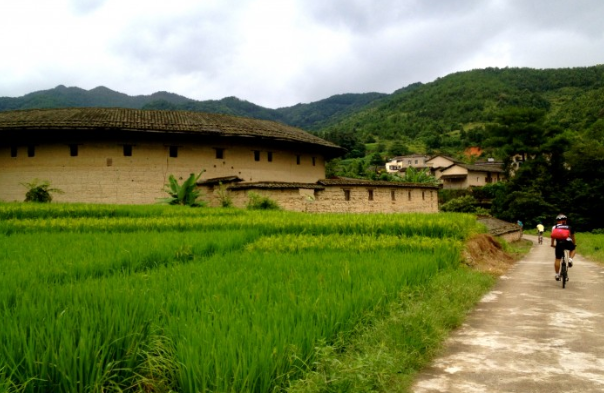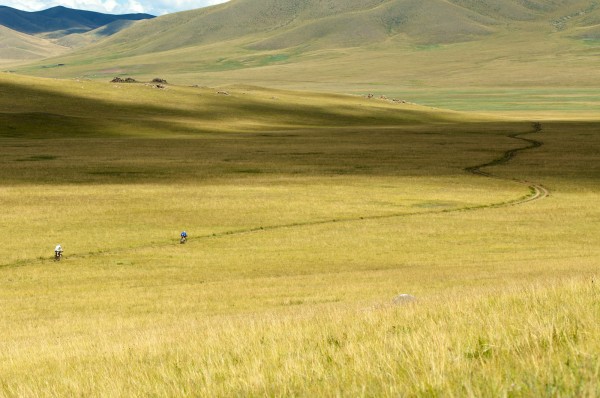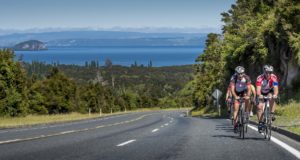China has a stunning variety of places to discover by bicycle and this Cycle Travel series is part of my goal to show-case the cycling opportunities in China as well in other Asian countries. Expect to see more inspirational ideas and photographs to inspire you to travel with your bicycle more often. I have not yet gone myself to visit the Tulou’s but that is one of my listed destinations. There is a cycle invitational race this week in Fujian and hopefully we’ll get the chance to visit the UNESCO sites. Images and words kindly provided by Bruce Foreman.
Cycling in Fujian is like travelling through time, if you can get beyond the superhighways and trucks hauling goods, the wastelands of worker-apartments and export factories littering the coast: a whole world steeped in history and nature awaits you.
The trick is to hit the hills, seek smaller roads, then leave these for the tiny country lanes that wind through mud brick villages, feeding into the farms that produce Fujian’s original and most famous export of all – tea!
Fujian Oolongs are prized through out China, and the small-owner-farmer produced teas have preserved an ancient landscape that is a joy to cycle through, particularly when the roasting leaves scent the air, or a farmer invites you to stop and sample their produce.
There is almost always something tea related to dodge on your bicycle. Farmers dry the tealeaves on mats by the road edge. Pickers on motorbike pull out of side roads, their bikes stacked tall with bagged leaves.
Don’t let the hills put you off. These are mostly undulating, and for the tougher ones there are plenty of excuses to stop – tea, vistas, and the magnificent tulou architecture. A tulou is a large, circular enclosed fortified building made from earth. The walls are very thick and are usually three to five stories high; one tulou typically can house up to 80 families.
Fujian is famous for rammed earth fortresses called tulou. Geomantically arrayed throughout the valleys, Fujian’s hundreds of tulou were built mostly by the Hakka clan’s who fled war and famine in Northern China 800 years ago, only to find that they had to protect themselves from bandits who infested the Fujian interior. These fortresses have served to time-capsule the culture of the Hakka clans.
The most famous Tulou are multi storied and circular. Housing hundreds of people, families live in a vertical column, facing inwards across a courtyard that always contains an internal well, often times livestock, and food products being dried, pickled. Preserved foods are hall-marks of Hakka cuisine, in case the clans had to hold out inside the fortresses for long periods of time.
UNESCO has recently listed 46 Fujian Tulou as buildings of outstanding cultural heritage. This has brought tour buses filled with tour groups, and regretablly commercialized the culture. Tourists are corralled and herded into select tulou that are essentially now tea and souvenir shops. Impressive structures, it is wonderful to be able to sail by these UNESCO tulou on a bicycle, avoiding the aggressive grannie tea-pushers. Appreciating the fengshui characteristics from a comfortable distance, cyclists are independent and can get off the beaten path to explore and discover the least visited tulou, where tea is served with genuine warmth, and frequently is not for sale – as it is from the farmer’s own limited and precious personal supply. This tea that doesn’t make it to market is the stuff you really want.
Yongding and Nanjing are the two counties most saturated in tulou. Yongding is more Hakka – vivid-lime from with rice planted along the valley floors, and tobacco along it’s terraced hills. Nanjing is more Minnan – the predominant ethnic group of Fujian who learnt rammed earth from the Hakka, but bought in hedged tea fields as their predominant crop to produce the famous Fujian Iron Goddess Tea (Tie Guanyin).
Sweet and florally fragrant – this tea is an obsession with Fujianese and has become a craze all across China. But the Fujianese do not believe that it tastes the same unless brewed with local mountain spring water in traditional kungfu style
So jump on a bike, taste the tea at it’s source served with genuine warmth and kungfu skill, from within the spectacular architecture of the ancient Hakka tulou.
Getting there
Yongding is 5 hours by train from Xiamen. Nanjing / Yongding is 3 – 5 hours by public bus from Xiamen. Best to fly into Xiamen airport and use Xiamen city as your base to launch your cycle travels.
The Hutong organize a cycling tour to this part of Fujian – The Hutong Tea and Tulou Eco-Cycle Weekend Getaway. If you prefer to book a tour where a guide will organize everything for you, then Bruce Foreman from The Hutong will take you on the Fujian cycling adventure in China that you won’t forget.
BikeChina also organize a Fujian cycling tour starting in Shantou and ending in Xiamen, should you want something that is longer at 7-days. If your time is limited, then the tour with The Hutong just for the weekend would be perfect.







The little boy looks so cute, and very happy. I also like the last picture
We had a good time exploring this amazing place with Access China Travel before.. an unforgettable trip to Fujian,China
Hello, I’m sending you this message to ask if
I can buy and post an article on your website. Below is some information:
– article will be written by us and will be original;
– we do the article , so that it is relevant to your site theme;
– article will contain a link to a gambling site , and a picture;
– if you give us an good offer we can do a long partnership ;
Thank you for reading the message, have a good day and I look response !
christiana.micch@gmail.com